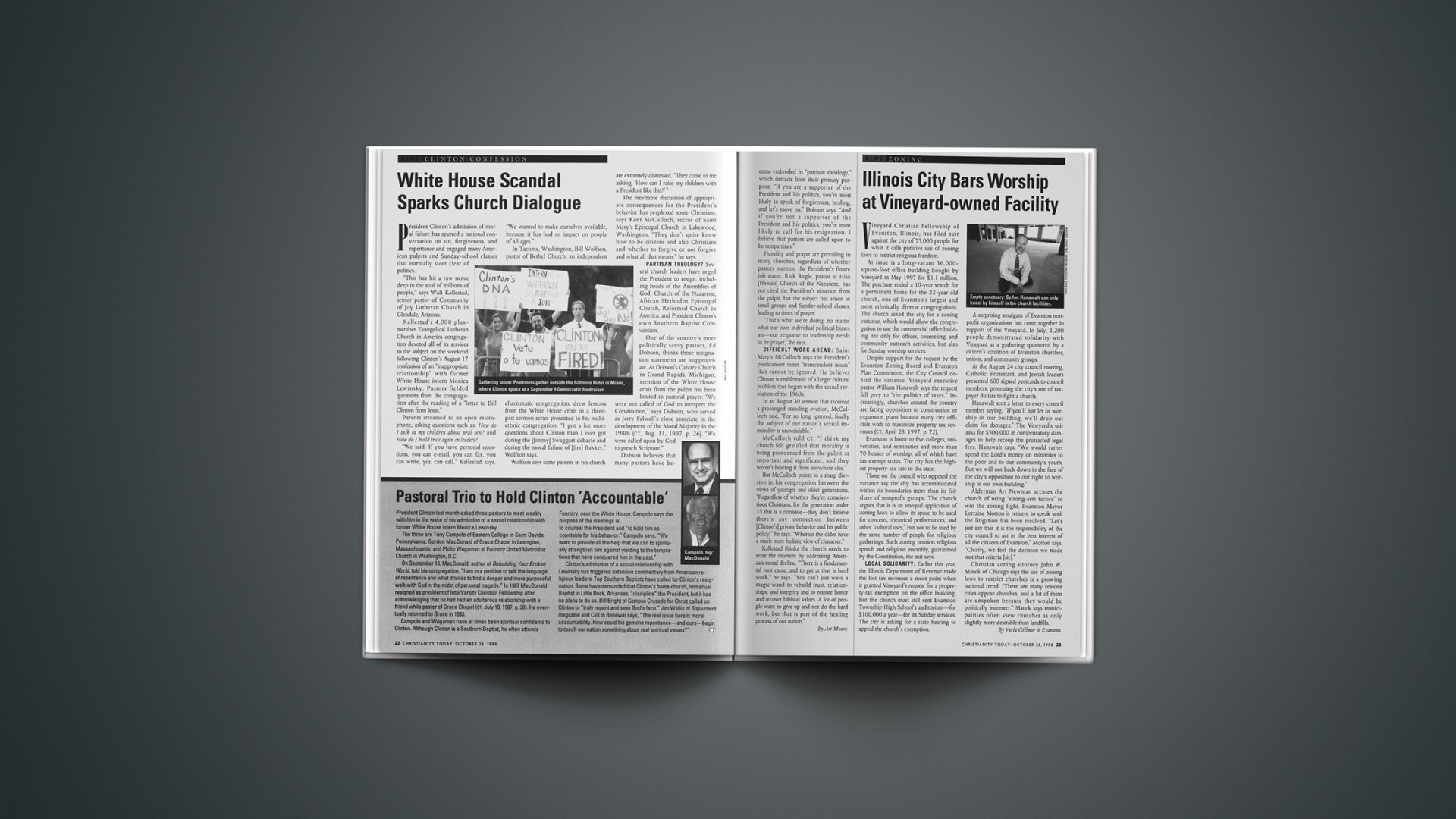President Clinton’s admission of moral failure has spurred a national conversation on sin, forgiveness, and repentance and engaged many American pulpits and Sunday-school classes that normally steer clear of politics.
“This has hit a raw nerve deep in the soul of millions of people,” says Walt Kallestad, senior pastor of Community of Joy Lutheran Church in Glendale, Arizona.
Kallestad’s 4,000 plus- member Evangelical Lutheran Church in America congregation devoted all of its services to the subject on the weekend following Clinton’s August 17 confession of an “inappropriate relationship” with former White House intern Monica Lewinsky. Pastors fielded questions from the congregation after the reading of a “letter to Bill Clinton from Jesus.”
Parents streamed to an open microphone, asking questions such as: How do I talk to my children about oral sex? and How do I build trust again in leaders?
“We said: If you have personal questions, you can e-mail, you can fax, you can write, you can call,” Kallestad says. “We wanted to make ourselves available, because it has had an impact on people of all ages.”
In Tacoma, Washington, Bill Wolfson, pastor of Bethel Church, an independent charismatic congregation, drew lessons from the White House crisis in a three-part sermon series presented to his multiethnic congregation. “I got a lot more questions about Clinton than I ever got during the [Jimmy] Swaggart debacle and during the moral failure of [Jim] Bakker,” Wolfson says.
Wolfson says some parents in his church are extremely distressed. “They come to me asking, ‘How can I raise my children with a President like this?'”
The inevitable discussion of appropriate consequences for the President’s behavior has perplexed some Christians, says Kent McCulloch, rector of Saint Mary’s Episcopal Church in Lakewood, Washington. “They don’t quite know how to be citizens and also Christians and whether to forgive or not forgive and what all that means,” he says.
PARTISAN THEOLOGY? Several church leaders have urged the President to resign, including heads of the Assemblies of God, Church of the Nazarene, African Methodist Episcopal Church, Reformed Church in America, and President Clinton’s own Southern Baptist Convention.
One of the country’s more politically savvy pastors, Ed Dobson, thinks those resignation statements are inappropriate. At Dobson’s Calvary Church in Grand Rapids, Michigan, mention of the White House crisis from the pulpit has been limited to pastoral prayer. “We were not called of God to interpret the Constitution,” says Dobson, who served as Jerry Falwell’s close associate in the development of the Moral Majority in the 1980s (CT, Aug. 11, 1997, p. 26). “We were called upon by God to preach Scripture.”
Dobson believes that many pastors have become embroiled in “partisan theology,” which detracts from their primary purpose. “If you are a supporter of the President and his politics, you’re most likely to speak of forgiveness, healing, and let’s move on,” Dobson says. “And if you’re not a supporter of the President and his politics, you’re most likely to call for his resignation. I believe that pastors are called upon to be nonpartisan.”
Humility and prayer are prevailing in many churches, regardless of whether pastors mention the President’s future job status. Rick Ragle, pastor at Hilo (Hawaii) Church of the Nazarene, has not cited the President’s situation from the pulpit, but the subject has arisen in small groups and Sunday-school classes, leading to times of prayer.
“That’s what we’re doing, no matter what our own individual political biases are—our response to leadership needs to be prayer,” he says.
DIFFICULT WORK AHEAD: Saint Mary’s McCulloch says the President’s predicament raises “transcendent issues” that cannot be ignored. He believes Clinton is emblematic of a larger cultural problem that began with the sexual revolution of the 1960s.
In an August 30 sermon that received a prolonged standing ovation, McCulloch said, “For so long ignored, finally the subject of our nation’s sexual immorality is unavoidable.”
McCulloch told CT, “I think my church felt gratified that morality is being pronounced from the pulpit as important and significant, and they weren’t hearing it from anywhere else.”
But McCulloch points to a sharp division in his congregation between the views of younger and older generations. “Regardless of whether they’re conscientious Christians, for the generation under 35 this is a nonissue—they don’t believe there’s any connection between [Clinton’s] private behavior and his public policy,” he says. “Whereas the older have a much more holistic view of character.”
Kallestad thinks the church needs to seize the moment by addressing America’s moral decline. “There is a fundamental root cause, and to get at that is hard work,” he says. “You can’t just wave a magic wand to rebuild trust, relationships, and integrity and to restore honor and recover biblical values. A lot of people want to give up and not do the hard work, but that is part of the healing process of our nation.”
Copyright © 1998 Christianity Today. Click for reprint information.










